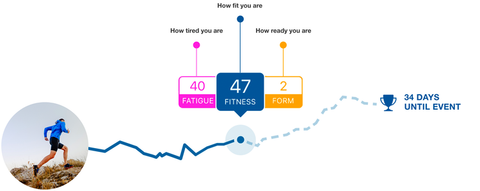We asked, Summer Spine Challenger Winner '22, Tim Pigott of HP3 coaching how he prepares his athletes and himself for an event such as UTS the UK's only UTMB® World Series event. Tim will be starting in the UTS 100M.
In this post, Tim will explore some essential considerations for preparing for an ultra marathon. Taking inspiration from Simon Sinek's Golden Circle concept and begin by examining the 'why' behind your decision to run an ultra marathon.
Start with ‘Why’

Preparing for an ultramarathon can be a daunting task, but with the right mindset and approach, it is an achievable goal. Before you start your training, it is important to understand why you are doing this. You should clarify your "why" using Simon Sinek's 'Golden Circle' idea. Knowing why you run and why you have signed up for this challenge will help you through the training and the race itself.
What exactly is the challenge?

After understanding why you are doing this, you should consider the distance, terrain, and environment of the ultramarathon. You should also think about the support in place, navigation requirements, and your experience in running on the same terrain. Each ultramarathon has its own unique challenges, so it is important to identify your goal event's challenges and design your training accordingly.
Make your slowest pace… faster.

Regardless of the distance, an ultramarathon is a long way. Even the fastest runners will walk sections. Therefore, walking needs to become a key part of your training. Make your walking purposeful, and you can make your slowest speed more efficient, and thus faster. Incorporating walking into your everyday life can help with this. Walking to work, the shops, or hiking at the weekends can all help. Getting out into the hills and hiking, while keeping your HR low, is a really good way to build your aerobic base.
Where is your fitness now?

It is essential to know where you are starting from in terms of your fitness level. Are you starting from a baseline of a weekly park run and a few mid-week runs totaling 15-20 miles per week, or are you comfortable running up to a marathon distance and are looking for the next challenge? Knowing where you are starting from, you can set realistic expectations for your fitness come race day.
Goal setting - focus on the process

Setting yourself process goals is essential to achieve your goal. You should identify the processes you need to work on to achieve your goal. For instance, do you need to build up your 'time on feet' or build up your weekly mileage? Building up your skills on technical ground, strength training, and mental training are other processes you may need to work on.
Start slow and be consistent

Starting slow and building slowly is key to avoid burnout and injury. Increasing weekly mileage is important, but it is worth taking more notice of your weekly time on feet, especially if you are doing more hills and technical terrain. Even short runs of 30 minutes add up. You are better off doing more frequent short runs than only a couple of much longer runs per week.
The same goes for racing. Slower starts and an even pacing over the whole duration of the event will lead to your fastest times. Do not be tempted to race off too hard at the start!
To Conclude
Preparing for an ultramarathon requires dedication, discipline, and patience. With a clear understanding of why you are doing this, knowing the distance, terrain, and environment of the event, setting realistic expectations and process goals, and starting slow and building slowly, you can increase your chances of finishing the race with a smile on your face.

